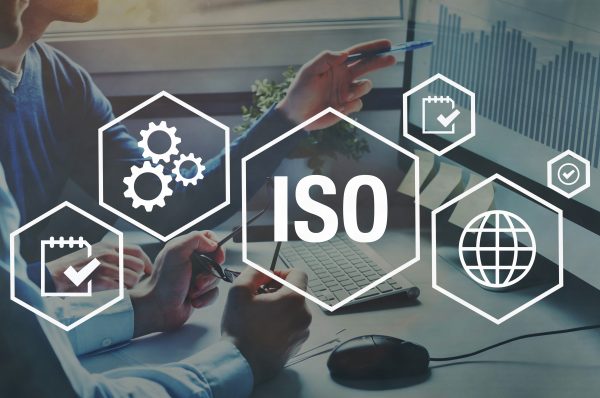ISO 27001 Certification Fundamentals
ISO 27001 certification applies to businesses of all sizes and ensures that organizations effectively identify and manage data security risks. Last updated: Nov 8, 2024 Business operations in the digital era are all about data. Employee personal information, supplier data, customer information, intellectual property, financial records, and health records - are all common data types that most modern businesses possess. Failure to track and secure sensitive data exposes organizations to multiple risks like loss of contracts, financial troubles, reputational damage, potential data breaches, and fines. As much as 43% of organizations cannot identify the location of their critical data, 59% - outsource data storage. Worse yet, customers don’t trust businesses with their data - 9 in 10 customers are concerned about the security of their private information. Another 92% believe that companies often prioritize profits over protecting customer data. To help businesses manage information securely, the International Standard Organization (ISO) created a comprehensive set of guidelines called the ISO/IEC 27001:2022 (a.k.a. ISO 27001). It provides a unified approach to establishing, organizing, monitoring, and maintaining organizations’ Information Security Management Systems (ISMS). Meanwhile, ISO 27001 certification applies to businesses of all sizes and ensures that organizations effectively identify and manage data security risks. Read more about what ISO 27001 certification is, its benefits and price, and the right way to achieve it.
What is ISO 27001?
ISO/IEC 27001 is one of the world’s most reputable standards for managing an organization’s Information Security Management Systems (ISMS). The standard details requirements for establishing, implementing, maintaining, and continually improving ISMS. ISO 27001 was initially published in 2005, then revised in 2013, and again most recently, at the end of 2022. The main purpose of the last standard’s updates was to align it to ISO 27002:2022, published earlier. [NOTE: ISO 27002 isn’t a certification standard but a companion to ISO 27001 that provides guidance and explains the purpose, design, and implementation of each control in greater detail.] The other reason was to make the standard more manager-oriented rather than IT specialists-oriented. ISO 27001 is broken down into 10 Clauses and Annex A controls. These controls create the foundation of ISO 27001 certification requirements.
ISO Clauses
The ISO 27001 Clauses define the requirements for the overall structure and operation of the ISMS. Clauses 0 to 3 provided an introduction to the ISO/IEC 27001 standard, such as Scope, Normative Requirements, Terms and Definitions. Clauses 4-10 outline the minimal compliance expectations for certification and include the Context of the Organization, Leadership, Planning, Support, Operation, Performance Evaluation, and Improvement.
ISO Annex A
Annex A outlines each objective and control to help organizations decide which ones they should use. Annex A of ISO 27001 provides a list of specific security controls that organizations can implement to address the risks they identify during their risk assessment. These controls are more detailed and prescriptive than the high-level clauses and serve as practical measures to mitigate risks. Previously, ISO 27001 had 114 controls organized into 14 domains or simply control families. With the recent updates in 2022, some of the controls were added, some merged, some renamed, and some - removed. Now, there are 93 controls grouped into four main themes, very similar to the HIPAA structure:
- people controls;
- organizational controls;
- technological controls ;
- physical controls .
What is ISO 27001 Certification?
ISO 27001 certification confirms that the organization’s information security management system meets the ISMS requirements established in the standard. Thus, ISO certification adds credibility by demonstrating that your organization has a mature and constantly improving information security program for your partners and customers. ISO does not perform certification or issue certificates. Certification is performed by certification bodies accredited by the relevant CASCO standard. Some ISO certification companies are listed below:
Certification is valid for 3 years with annual surveillance audits while the certificate remains valid. To ensure compliance is maintained yearly in time for these audits, certified organizations must commit to routine internal audits.
How Businesses Benefit From ISO 27001 Certification
Absolutely all businesses that manage sensitive data can benefit from ISO 27001 certification. It serves as a powerful business differentiator, instilling confidence in all your stakeholders that entrust their valuable information data assets to your organization. This confidence opens new business opportunities and provides a stable security background from potential risks and vulnerabilities. Organizations can enjoy a number of benefits from being ISO 27001 certified. Here are some of them:
Enhanced Security
ISO 27001 certification offers a structured framework for managing sensitive information, identifying potential risks, and deploying effective controls for mitigation. By adhering to ISO 27001 standards, organizations can establish a robust information security management system that defends against diverse threats such as cyberattacks, data breaches, and insider risks. This proactive stance not only bolsters asset protection but also fosters trust among customers, partners, and regulatory bodies.
Improved Risk Management
ISO 27001 provides a systematic approach to identifying, assessing, and mitigating information security risks and vulnerabilities. Regular security risk assessments proactive threat management, minimizing the likelihood of threat occurrence and mitigating their impact. This approach safeguards sensitive information and aids organizations in adapting to evolving cyber threats and business risks.
Regulatory Compliance
ISO 27001 certification showcases a dedication to internationally recognized best practices in information security management. These practices, in turn, help maintain compliance with regulations like GDPR and HIPAA. By aligning security practices, organizations can reduce the chances of facing fines, legal issues, and reputational damage tied to non-compliance.
Competitive Advantage
Organizations that hold ISO 27001 certification demonstrate that they take information security seriously and have a structured approach to planning, implementing, and maintaining ISMS. The data protection commitment gives organizations a competitive advantage in securing contracts, appeals to customers focused on security and strengthens current relationships. Moreover, certification provides access to international markets where compliance with global standards is highly regarded.
Enhanced Stakeholders Trust
ISO 27001 certification boosts confidence, demonstrates credibility, and enhances brand reputation in the eyes of customers, partners, and other stakeholders, ensuring that their information is safe.
How to get ISO 27001 Certification
Every organization has unique challenges, and your ISMS must adapt to your particular situation. These steps can help organizations obtain ISO 27001 certification, achieve and maintain accreditation.
Ensure secure stakeholders’ commitment
In ISO 27001, stakeholder commitment ensures leadership support, resource allocation, and active involvement across all organizational levels. Leadership sets policies and promotes a security-focused culture while employees, partners, and vendors adhere to ISO controls. This commitment drives resource allocation, aligns security with business goals, and fosters a culture of continuous improvement, helping organizations maintain compliance, protect data, and effectively manage security risks.
Identify, classify, and prioritize risks
Conduct a detailed risk assessment of your organization and map applicable security controls. The risk assessment aims to identify which risks exist and determine the related areas of weakness. Prioritize these risks based on the level of threat they pose to the business.
Take security measures to mitigate the identified risks
Once risks are identified, it's important to select security measures that help mitigate those risks. All risks, controls, and mitigation methods must be clearly defined and documented. This helps organizations provide clear guidance to their stakeholders and create a strategic framework that serves as a foundation for information security.
Implement security controls
Once the risks, controls, and goals are penciled in, the business should hit the ground running. This involves not only the implementation of new controls, policies, and processes but also a change in the workplace culture.
Ensure continuous monitoring and improvement
As the business evolves, processes and systems also evolve, and so do risks. Businesses must continuously monitor and adjust security controls to align with these evolving risks. A good idea is to conduct a preliminary audit prior to the actual certification audit to uncover any gaps that could negatively impact the final certification. Security is not a destination but a journey. You may have already been audited and certified, but it's essential to continue monitoring, adjusting and improving your ISMS. The ISO 27001 mandates third-party audits (monitoring audits) at planned intervals to ensure you still comply with the standard. ISO 27001 is not only about protecting data; it's also about improving the business. Organizations that can harness these best practices will arrive at a superior security posture and enjoy significant competitive advantages.
ISO 27001 Certification Price
The ISO 27001 certification cost combines several elements and greatly depends on the organization's size, technology footprint and complexity, current security stacks, and other factors. The main elements include:
Readiness Assessment - Starting at $8,000
A readiness assessment is an optional but recommended step that evaluates the organization’s current ISMS against ISO 27001 requirements before the certification audit. ISO 27001 certification readiness assessment is generally conducted by outsourced experts who provide critical insights and a roadmap to certification. Readiness assessment reduces risks by identifying potential issues early, helping the organization avoid costly remediation and certification delays.
Internal Audit Cost - Starting at $8,000
Internal audits are conducted periodically by in-house or outsourced auditors to evaluate compliance with ISO 27001 requirements. This process includes reviewing ISMS documentation, testing controls, and addressing any previous issues. Internal auditors must be trained in ISO 27001 standards and able to identify potential compliance issues. This specialized knowledge, along with the time-intensive nature of the internal audit, contribute to the cost.
Remediation Work - Starting at $25,000 (Varies Significantly)
Remediation work addresses deficiencies or gaps discovered during internal audits or the readiness assessment. This may involve updating policies, implementing additional security controls, improving access management, or addressing technology vulnerabilities. Expenses on remediation vary widely based on the complexity of the organization’s systems, the number of changes needed, and potential costs for new technology. Proper remediation is essential for aligning with ISO 27001 and avoiding certification failure, making it a crucial but variable investment.
ISO Certification Audit Cost - Starting at $25,000
This is the final step to achieve certification. The certification audit is conducted by an accredited third-party auditor who assesses the organization’s ISMS against ISO 27001 standards. Accredited certification bodies charge premium fees due to their expertise, credentials, and the extensive effort involved in verifying ISO 27001 compliance. So, this price is justifiable, as their assessment ultimately determines certification eligibility, impacting the organization’s reputation and compliance standing. Together, these steps represent the comprehensive investment required for ISO 27001 certification.
Get Started your ISO 27001 Certification Process with Planet 9
Planet 9 has consulting experience helping clients become and remain ISO certified. Our experienced Chief Information Security Officers and compliance managers have years of experience working with the ISO 27001 standard. Depending on your internal resources’ expertise and availability, Planet 9 can entirely or partially assist with the following:
- Establish the scope and objectives of your ISMS
- Perform a security risk assessment
- Perform gaps remediation
- Manage internal and external audits
- Establish and maintain a continuous compliance program.
Contact our Planet 9 team for more details. We’ll be happy to assist!







